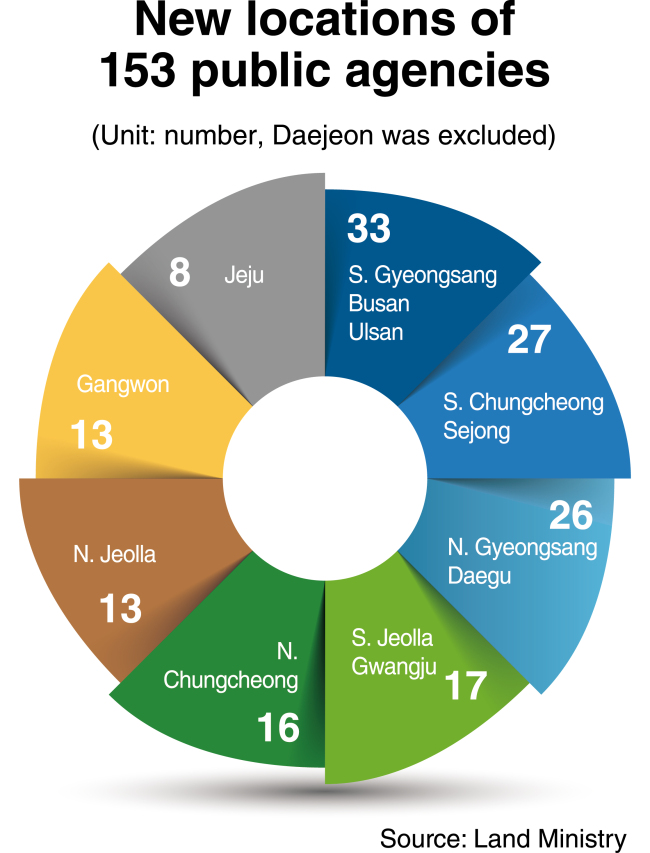[News Focus] More state-run agencies likely to move out from Seoul
By Kim Yon-sePublished : March 10, 2019 - 15:38
SEJONG -- A project to remedy the problem of imbalanced development among the different regions in South Korea began 16 years ago under the government of former President Roh Moo-hyun. It entailed relocation of the headquarters of many public agencies, including state-funded firms and institutes, from the Seoul metropolitan area to provincial cities across the country.
According to the Land Ministry, 150 of the 153 targeted agencies have already relocated over the past decade in the first phase.
The Agro Fisheries & Food Trade Corp. moved to Naju, South Jeolla Province; the National Pension Service to Jeonju, North Jeolla Province; and the National Tourism Organization to Wonju, Gangwon Province.
The National Institute of Meteorological Sciences and the Korea Development Institute respectively relocated their headquarters to Seogwipo on Jeju Island and to Sejong Self-Governing City. The Korea Employment Information Service has established its new office in Eumseong, North Chungcheong Province.
According to the Land Ministry, 150 of the 153 targeted agencies have already relocated over the past decade in the first phase.
The Agro Fisheries & Food Trade Corp. moved to Naju, South Jeolla Province; the National Pension Service to Jeonju, North Jeolla Province; and the National Tourism Organization to Wonju, Gangwon Province.
The National Institute of Meteorological Sciences and the Korea Development Institute respectively relocated their headquarters to Seogwipo on Jeju Island and to Sejong Self-Governing City. The Korea Employment Information Service has established its new office in Eumseong, North Chungcheong Province.

Of the relocated agencies, 33 have been established in the vicinity of Busan, Ulsan and South Gyeongsang Province, which together account for the greatest proportion. Another 27 can be found in the area surrounding Sejong and South Chungcheong Province -- but excluding Daejeon, which was already home to the Daedeok Science Complex. Daegu and North Gyeongsang Province were next on the list with 26, followed by Gwangju and South Jeolla Province with 17.
When former President Roh was advocating the project, the total number of public agencies plus central government arms nationwide came to 409. Of those, the head offices of 345 were in Seoul or the surrounding area.
For the second phase of the project, Democratic Party Chairman Lee Hae-chan has unveiled the ruling party’s plans to relocate 122 more state-funded agencies away from the capital region. Of those, 98 are presently headquartered in Seoul and the other 24 are in Gyeonggi Province or Incheon.
Because Lee is one of the few political heavyweights from the former Roh government who is still powerful in the incumbent Moon Jae-in administration, his remarks are drawing close attention.
The central government hopes to publicize the next round of relocations in coordination with the ruling party as a way to narrow regional polarization in terms of development, according to some private research analysts.

A noteworthy question is whether any of the nation’s financial bodies will appear on the list. The Financial Services Commission -- an arm of the government that is equivalent in status to 18 ministries -- is located in downtown Seoul, while the Ministry of Economy and Finance has already moved to the Government Complex Sejong. Meanwhile, the Financial Supervisory Service, which is headquartered in Yeouido, Seoul, has been exempt from its former status as a public agency for about 10 years since 2009.
Many market watchers say it is still necessary to exclude public-financing or oversight entities from the relocation efforts, in consideration of the fact that major commercial banks and other private financial firms have their headquarters in Seoul.
But one research analyst pointed out, on the contrary, that Korea Asset Management Corp., Korea Securities Depository and Korea Housing Finance Corp. have already moved to Busan and suggested that more could follow.
A finance-oriented district was established in Munhyeon-dong, Busan, in January 2009, and some lawmakers are seeking a legislative basis for the relocation of state-funded banks by proposing a series of bills to the National Assembly.
“Though it has been 10 years since Busan was designated as a financial hub, it has achieved little in the way of significant growth,” said Rep. Kim Hae-young of the Democratic Party.
Kim hosted a seminar on March 8 to discuss bills to relocate the state-run Korea Development Bank and the Export-Import Bank of Korea, where he reiterated his position that moving the two policy-bank offices to Busan would pave the way for the city’s evolution into a Northeast Asian finance hub.
At the same time, Rep. Kim Kwang-soo of the minor opposition Party for Democracy and Peace has proposed a bill to relocate the KDB and Korea Eximbank to the Jeonju-Wanju Innovation City in North Jeolla Province.
Concerning the second phase of the capital relocation project, the Ministry of Government Legislation in Sejong has stated that “it is reasonable that public agencies in the Seoul metropolitan area should move to provincial districts, excluding unavoidable cases.”
A Sookmyung Women’s University professor was quoted by a news outlet as saying state-run banks constituted unavoidable cases because they “must frequently consult with enterprises (in Seoul) on corporate loans and expeditiously issue short-term bonds. A relocation could go against financial efficiency.”
Some critics say there have been adverse effects over the past few years as a result of the increased physical distance between private companies and government agencies that must work closely together.
According to data compiled by the Land Ministry, 91 percent of Korea’s 100 major private enterprises are headquartered in the Seoul metropolitan area.
By Kim Yon-se (kys@heraldcorp.com)








![[Kim Seong-kon] Democracy and the future of South Korea](http://res.heraldm.com/phpwas/restmb_idxmake.php?idx=644&simg=/content/image/2024/04/16/20240416050802_0.jpg&u=)







![[KH Explains] Hyundai's full hybrid edge to pay off amid slow transition to pure EVs](http://res.heraldm.com/phpwas/restmb_idxmake.php?idx=652&simg=/content/image/2024/04/18/20240418050645_0.jpg&u=20240418181020)

![[Today’s K-pop] Zico drops snippet of collaboration with Jennie](http://res.heraldm.com/phpwas/restmb_idxmake.php?idx=642&simg=/content/image/2024/04/18/20240418050702_0.jpg&u=)